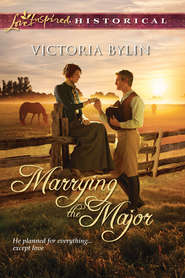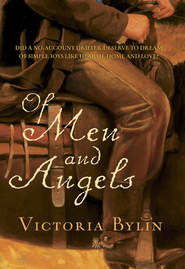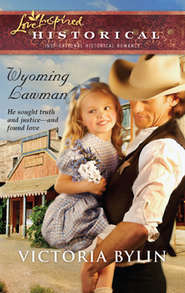По всем вопросам обращайтесь на: info@litportal.ru
(©) 2003-2024.
✖
Kansas Courtship
Настройки чтения
Размер шрифта
Высота строк
Поля
“You got any ideas?” he said to Pete.
“Hire her for a month,” the blacksmith replied. “See how she does.”
The idea had merit. Zeb could place another ad in the Kansas Gazette. While he waited for replies, the lady doctor could treat sore throats and hangnails. “It would buy time,” he said. But where could he put her for that time? No, his first instinct was right—the best solution would be for her to leave in the morning with the Crandalls.
“Who knows?” Pete replied. “She might work out just fine.”
Zeb doubted it. Thanks to Frannie, he knew all about women like Dr. Nora Mitchell. She was ambitious. She’d do anything—even twist the truth—to get her way.
With sweat beading his brow, he recalled the day Frannie left him standing on the church steps, engagement ring in hand. Plain and simple, she’d jilted him for her career. Losing the love of his life had changed him the way Pete’s pounding had shaped the hoe. Like the iron, Zeb’s heart had been red-hot and pliable. He’d have done anything for Frannie. After being jilted, his heart had cooled to black.
So had his soul. In Zeb’s opinion, the Almighty was either lazy or cruel. Zeb had no love for a God who ignored tornadoes and let children be snatched away. He feared Him, though. Who wouldn’t?
He wondered what Dr. Mitchell would say about such matters, then decided he didn’t care. Aside from telling Pete about the lady doctor, he had other business with the blacksmith. With the need for lumber, Zeb was running the mill eighteen hours a day. Long hours meant more stress on men and equipment, but he had no choice. A half-dozen buildings needed major repairs before winter, and he’d vowed to finish the town hall in time for a summer jubilee. He had a month to go and needed the sawmill at full power. But with the long hours, there were equipment breakdowns at least twice a week.
“A blade lost a few teeth yesterday,” he said to Pete. “Can you fix it?”
“Bring it tomorrow.”
Pete inspected the hoe, set it down and whipped off his heavy gloves. “How’s the town hall coming along?”
“It’s framed,” Zeb answered. “I’ve got a crew working on the roof.”
The men slipped into an easy conversation about wood and welding, things they understood. Women weren’t on that list. Zeb opened his pocket watch, a gift he treasured from Mr. Gridley, and saw he had two minutes to get to the boardinghouse. “I’ve got to go see that lady doctor.”
The blacksmith put his gloves back on. “Maybe she’ll surprise you.”
Zeb doubted it, but for his friend’s sake he’d give her a chance. For her sake, he intended to spell out what she’d be facing. Once she saw the tornado damage, particularly Doc’s old office, she’d be crazy to stay in High Plains.
Considering she’d been crazy to become a doctor, the thought gave him no comfort.
With her medical bag in hand, Nora knocked on the front door of the boardinghouse. No answer. She knocked again, more boldly this time.
A middle-aged woman with a tight bun flung it open. “What is it, miss?”
“I’m Dr. Mitchell. I believe you have a room for me?”
“You’re not Dr. Mitchell,” she said. “You’re a woman.”
“I’m both.” Nora tried to disarm her with a smile, but she had no expectations. In her experience, older women were as resistant to a female doctor as men, even more so.
The woman appeared honestly confused. “Does Zeb know about this?”
“Yes.” Nora spoke through tight lips. “You must be Mrs. Jennings.”
“That’s right.” She buried her hands in her apron. “The room I’ve got is plain at best. You’re not going to like it, miss.”
“All I need is a bed and a dresser.” Nora had had fine things in New York. She’d enjoyed them, but she didn’t need high-class furniture to be comfortable. She indicated the duster. “I’m meeting Mr. Garrison, and I’m eager to freshen up. Could you show me to my room?”
The woman hesitated, then heaved a sigh. “I guess. You’ll need to sleep somewhere.”
Nora followed her into the entry hall. To the left she saw a parlor with an upholstered divan, side chairs and tables decorated with lace doilies. The room could have been in a Boston town house except for the smell of Kansas dust.
Mrs. Jennings indicated a row of hooks by the door. “Put your duster there.”
Nora set down her medical bag, slipped out of the filthy garment and hung it up. Later she’d shake out the dust. Satisfied, she picked up her medical bag and followed the landlady up the stairs.
Mrs. Jennings ran her hand along the railing. “I’ve got to warn you, miss. This town’s not expecting a lady doctor.”
“I understand.”
“Zeb must have had a fit when he saw you.” The woman looked over her shoulder, as if she still couldn’t believe her eyes. “I don’t know if you heard, but Dr. Dempsey died last week.”
The doctor’s passing meant High Plains needed her more than ever, but Nora’s heart sank. One thing she’d discovered—male doctors didn’t like or trust her, but they never compromised their patients. Dr. Dempsey would have helped her, even if he’d had to hold his nose while doing it.
“I’m sorry,” she murmured.
“He was a fine man.” The woman’s voice softened. “If you ask me, he worked himself to death after the tornado.”
“It must have been awful.” Nora thought of the missing twins. How many people had been injured? How many lives had been lost? And the damage to homes and businesses…Repairs had been going on for weeks, yet she’d been staggered by the extent of the work still required.
“At least the church is still standing,” Mrs. Jennings said. “It didn’t get a scratch. I can’t say the same about the town hall. There wasn’t a speck left except the foundation.”
At the top of the stairs, the woman turned down a long hall. Nora saw four doors on each side of the corridor and a single row of wall sconces. A window at the end of the hall shot a beam of light to the carpet. Dust motes floated like fireflies.
Mrs. Jennings opened the second door on the right. “Here’s your room, miss.”
“Please,” Nora said, sounding friendly. “Call me Dr. Nora.”
Mrs. Jennings looked over her shoulder and frowned. “That doesn’t seem right.”
Nora knew she was objecting to the title and not the use of her first name, but she deliberately misunderstood to make a point. If she didn’t ask for respect, she’d never get it. “Nora’s my name, but if you’d prefer to call me Dr. Mitchell, that’s fine, too.”
“Whatever you want, miss.”
Nora held in a sigh. If Zeb Garrison and Mrs. Jennings were typical of the folks in High Plains, she had a long road ahead of her.
Mrs. Jennings unlocked the door. As Nora stepped inside, she saw a narrow bed, a rough-hewn wardrobe and a vanity with a metal pitcher and washbowl. A red-and-blue quilt decorated the bed, and a window let in fresh air. The room struck her as plain, functional and the loveliest place she’d ever lived because it belonged to her alone.
She set the medical bag on the floor, then smiled at Mrs. Jennings. “This is perfect.”
The landlady huffed. “It is what it is. With the storm, I’ve got guests in every nook and cranny. Six families are living up here, along with an orphan boy from the wagon train. Don’t expect too much quiet.”
“I won’t.” Nora loved children, especially boys who couldn’t hold still.
Mrs. Jennings looked grim. “You’re going to have a hard time, miss.”
“How so?”











